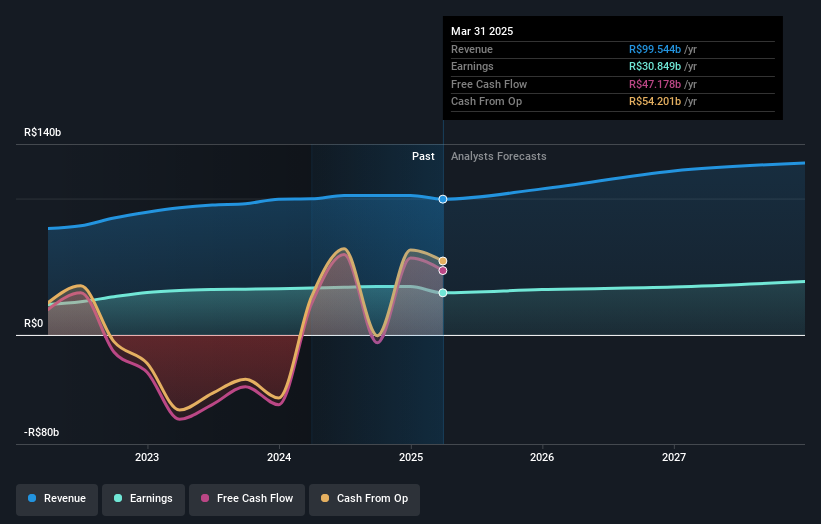Earnings Miss: Banco do Brasil S.A. Missed EPS By 18% And Analysts Are Revising Their Forecasts

As you might know, Banco do Brasil S.A. (BVMF:BBAS3) last week released its latest first-quarter, and things did not turn out so great for shareholders. Banco do Brasil missed earnings this time around, with R$24b revenue coming in 8.8% below what the analysts had modelled. Statutory earnings per share (EPS) of R$1.19 also fell short of expectations by 18%. Following the result, the analysts have updated their earnings model, and it would be good to know whether they think there's been a strong change in the company's prospects, or if it's business as usual. So we gathered the latest post-earnings forecasts to see what estimates suggest is in store for next year.

Taking into account the latest results, the consensus forecast from Banco do Brasil's ten analysts is for revenues of R$107.1b in 2025. This reflects a modest 7.6% improvement in revenue compared to the last 12 months. Per-share earnings are expected to rise 9.6% to R$5.92. Before this earnings report, the analysts had been forecasting revenues of R$111.3b and earnings per share (EPS) of R$6.42 in 2025. It's pretty clear that pessimism has reared its head after the latest results, leading to a weaker revenue outlook and a minor downgrade to earnings per share estimates.
See our latest analysis for Banco do Brasil
Despite the cuts to forecast earnings, there was no real change to the R$33.67 price target, showing that the analysts don't think the changes have a meaningful impact on its intrinsic value. The consensus price target is just an average of individual analyst targets, so - it could be handy to see how wide the range of underlying estimates is. The most optimistic Banco do Brasil analyst has a price target of R$45.00 per share, while the most pessimistic values it at R$24.00. Note the wide gap in analyst price targets? This implies to us that there is a fairly broad range of possible scenarios for the underlying business.
Another way we can view these estimates is in the context of the bigger picture, such as how the forecasts stack up against past performance, and whether forecasts are more or less bullish relative to other companies in the industry. We would highlight that Banco do Brasil's revenue growth is expected to slow, with the forecast 10% annualised growth rate until the end of 2025 being well below the historical 13% p.a. growth over the last five years. By way of comparison, the other companies in this industry with analyst coverage are forecast to grow their revenue at 14% per year. So it's pretty clear that, while revenue growth is expected to slow down, the wider industry is also expected to grow faster than Banco do Brasil.
The Bottom Line
The biggest concern is that the analysts reduced their earnings per share estimates, suggesting business headwinds could lay ahead for Banco do Brasil. Unfortunately, they also downgraded their revenue estimates, and our data indicates underperformance compared to the wider industry. Even so, earnings per share are more important to the intrinsic value of the business. The consensus price target held steady at R$33.67, with the latest estimates not enough to have an impact on their price targets.
With that in mind, we wouldn't be too quick to come to a conclusion on Banco do Brasil. Long-term earnings power is much more important than next year's profits. We have forecasts for Banco do Brasil going out to 2027, and you can see them free on our platform here.
Before you take the next step you should know about the 2 warning signs for Banco do Brasil that we have uncovered.
Valuation is complex, but we're here to simplify it.
Discover if Banco do Brasil might be undervalued or overvalued with our detailed analysis, featuring fair value estimates, potential risks, dividends, insider trades, and its financial condition.
Access Free AnalysisHave feedback on this article? Concerned about the content? Get in touch with us directly. Alternatively, email editorial-team (at) simplywallst.com.
This article by Simply Wall St is general in nature. We provide commentary based on historical data and analyst forecasts only using an unbiased methodology and our articles are not intended to be financial advice. It does not constitute a recommendation to buy or sell any stock, and does not take account of your objectives, or your financial situation. We aim to bring you long-term focused analysis driven by fundamental data. Note that our analysis may not factor in the latest price-sensitive company announcements or qualitative material. Simply Wall St has no position in any stocks mentioned.
About BOVESPA:BBAS3
Banco do Brasil
Provides banking products and services for individuals, companies, and public sectors in Brazil and internationally.
Undervalued established dividend payer.
Market Insights
Community Narratives




